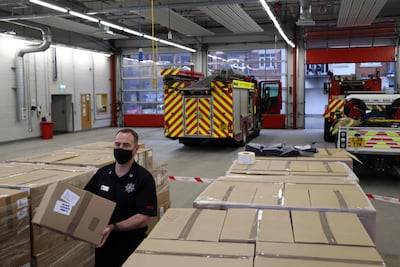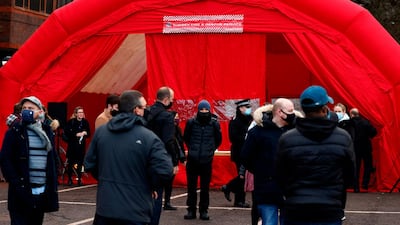Hundreds of thousands of people who live in parts of England where the South African variant of coronavirus has been found should reconsider their need to leave home, UK ministers said on Tuesday.
Authorities confirmed 43 cases of the virus featuring "mutations of concern" were found in the cities of Bristol and Liverpool, adding to 11 cases of the variant in people with no links to overseas travel found the day before, raising fears that the strain may be in community transmission.
Government ministers said that people in the affected areas should "think again" before they go outside, while scientists stressed the importance of suppressing the new variant to allow more time for people to be vaccinated.
As people were encouraged to stay at home, police officers and firefighters were called up to support a testing blitz of thousands of homes in England.
Urgent door-to-door testing of 80,000 people in eight postcodes across England aims to find "every single case" of the variant before it goes out of control.
Government minister Michelle Donelan said people in the affected areas should reconsider before they go outside.
"The message is 'think again' just before you go about activities, even for those activities that are within the rules such as essential shopping," she told Sky News on Tuesday.
As part of the campaign, home testing kits are being delivered and collected on the same day, while some areas are providing mobile testing sites.
In Kent, where the UK strain of Covid-19 was first identified, police, council workers and firefighters will visit homes to carry out on-the-spot tests of everyone in each household.
Adding to the concerns of the government, scientists suggested on Tuesday that there were "worrying" signs the UK variant had mutated again, although this was not unexpected as all viruses mutate as they evolve.
Health Secretary Matt Hancock said that those in the areas affected must comply with the request to be tested, even if they are asymptomatic, to break any chain of transmission.
"There's currently no evidence to suggest this variant is any more severe," he said. "But we need to come down on it hard, and we will."
Prof Nick Loman, from the Institute of Microbiology and Infection at the University of Birmingham, said that he expected more cases of the South African variant to emerge in the UK.
"It's almost inevitable a small fraction of people will transmit and sometimes those outbreaks can get pretty big and the idea is to try and suppress that," he told BBC Radio 4's Today programme.
Last week, the government announced a geographically targeted system of mandatory hotel quarantine aimed at preventing new strains from entering the UK.

Government scientists, however, advised Downing Street that the best way to keep out the new strain was an effective shutdown of borders with hotel quarantine for all travellers.
The Sage group, while not providing a specific recommendation, said on January 21 that the targeted system "cannot be relied upon to stop import of new variants because of the lag between the emergence and identification of variants of concern, as well as the potential for indirect travel via a third country", according to minutes obtained by The Times.
The opposition Labour party seized on the report and called on the government to immediately introduce a universal system of hotel quarantine.
“The real threat to our vaccine efficacy is a variant emerging that the vaccines that we have will be ineffective against," Shadow Home Secretary Nick Thomas-Symonds told the BBC. "We cannot take that risk.”
Home Office minister Robert Courts said "blanket restrictions" had been considered but were "not appropriate".
"We are an island nation yet a global hub,” he said.
Ms Donelan said that requiring all travellers to enter hotel quarantine wasn't realistic.
"We will continually evolve our strategies but that is unfeasible and we have to be realistic about what we adopt and what we do — and what is deliverable as well," she said.
Public Health England said it had identified 105 cases of the South African variant since December 22.
The figure marks a tiny percentage of the UK daily case load to date (see chart below) but scientists said that it appears to be more transmissible. There is no evidence that the Covid-19 strain causes more severe disease, however, although several laboratory studies have found that it reduces vaccine and antibody therapy efficacy.
Simon Clarke, associate professor in cellular microbiology at the University of Reading, said that there was emerging evidence to suggest the variant was less susceptible to immunity induced by the current crop of vaccines.
"The discovery of a handful of cases with no links to travel to Africa indicates that it might be more widespread in the community than previously thought," he said.
"This spread, even if small in scale, needs to be brought under control quickly, so Public Health England's house-to-house checks and intensive testing are the right thing to do."
Public Health England’s managing director Susan Hopkins said that the government was looking at an annual booster shot programme to protect against new variants of the virus in the future.
“It is unlikely that people would have to start [the vaccine treatment] again,” she said. “It is much more likely that it would be a booster shot — a bit like the annual flu vaccine.”
The UK's official Covid-19 death toll passed 100,000 last week but the country is making rapid progress in its vaccination programme, with nearly 9.3 million people having received the first dose of either the Pfizer/BioNTech or Oxford/AstraZeneca shot.

